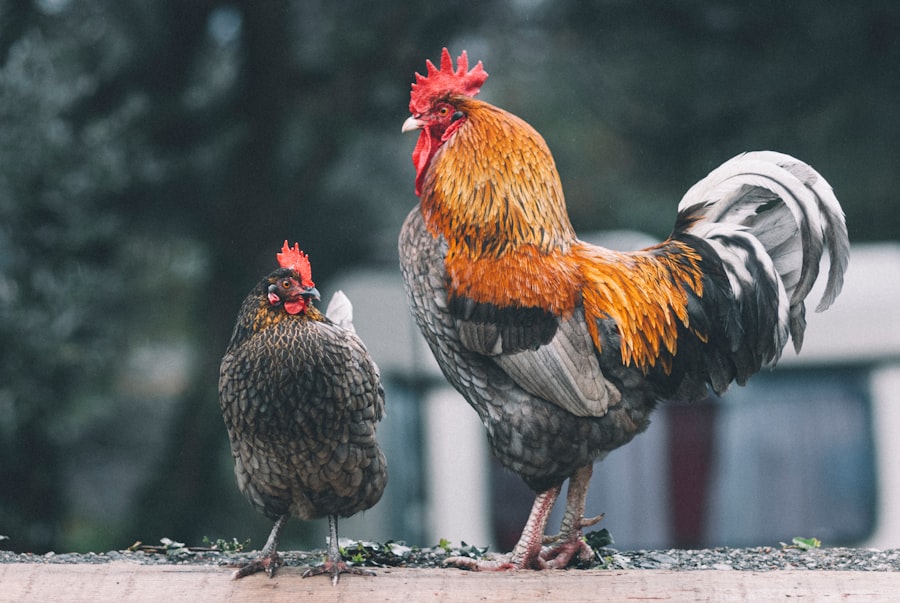Keeping chickens can be a rewarding and fulfilling experience for many reasons. Not only do chickens provide fresh eggs, but they also offer natural pest control and can be a fun hobby for the whole family. By keeping chickens, you can have a constant supply of fresh, organic eggs right in your backyard. These eggs are not only delicious but also packed with nutrients that are beneficial for your health.
In addition to the eggs, chickens also provide natural pest control. They love to eat insects, slugs, and other pests that can damage your garden. By allowing your chickens to roam freely in your yard, you can reduce the need for harmful pesticides and keep your garden healthy and thriving.
Keeping chickens is also a great hobby for the family. It teaches children about responsibility and caring for animals. They can learn about the life cycle of chickens, from hatching eggs to raising chicks. It also provides an opportunity for quality family time as you work together to care for the chickens and enjoy their company.
Key Takeaways
- Keeping chickens can be a great idea for those who want fresh eggs and a fun hobby.
- It’s important to know the legal regulations in your area before starting a chicken coop.
- Chickens need a certain amount of space to be healthy and happy.
- Choosing the right chicken coop involves considering size, material, and design.
- Nesting boxes are essential for laying hens and should be included in your coop design.
Legal Regulations: Know the Rules in Your Area
Before you decide to keep chickens, it is important to research and understand the legal regulations in your area. Different cities and towns have different rules regarding keeping backyard chickens, so it is crucial to know what is allowed and what is not.
Some areas may have restrictions on the number of chickens you can keep or require specific permits or licenses. There may also be regulations regarding coop size, setback requirements, noise restrictions, and waste management. It is important to follow these regulations to avoid fines or legal trouble.
To find out the regulations in your area, you can contact your local government or animal control office. They will be able to provide you with the necessary information and answer any questions you may have. It is always better to be informed and comply with the rules rather than risk facing legal consequences.
Space Requirements: How Much Room Do Chickens Need?
Chickens require a certain amount of space to live comfortably and thrive. The amount of space needed depends on the breed and the number of chickens you plan to keep. As a general rule, each chicken should have at least 4 square feet of indoor space in the coop and 10 square feet of outdoor space in the run.
Providing outdoor space for chickens is important as it allows them to roam, forage, and engage in natural behaviors. This outdoor space should be securely fenced to protect the chickens from predators and should also include areas for dust bathing and perching.
If you have limited space, there are smaller breeds of chickens that require less space. Bantam breeds, for example, are smaller in size and require less space compared to standard-sized breeds. It is important to consider the space requirements before getting chickens to ensure that they have enough room to live comfortably.
Choosing the Right Chicken Coop: Size, Material, and Design
Choosing the right chicken coop is essential for the health and well-being of your chickens. The coop should provide adequate shelter, protection from predators, and ventilation. It should also be easy to clean and maintain.
When selecting a coop, consider the size based on the number of chickens you plan to keep. As mentioned earlier, each chicken should have at least 4 square feet of indoor space. The coop should also have enough roosting bars for the chickens to perch on at night.
The material of the coop is also important. Wood is a popular choice as it provides insulation and durability. However, it requires regular maintenance to prevent rotting and pest infestations. Other options include plastic or metal coops, which are easier to clean but may not provide as much insulation.
The design of the coop should also be considered. It should have easy access for cleaning and egg collection. It should also have windows or vents for proper ventilation. The coop should be predator-proof, with secure locks and wire mesh to prevent entry from predators.
Nesting Boxes: Essential for Laying Hens
Nesting boxes are essential for laying hens as they provide a safe and comfortable place for them to lay their eggs. The nesting boxes should be dark, quiet, and secluded to mimic the natural environment that chickens prefer for laying eggs.
There are different types of nesting boxes available, including individual boxes or communal boxes. Individual boxes provide privacy for each hen, while communal boxes allow multiple hens to share the same space. The size of the nesting box should be large enough for the hen to comfortably enter and exit.
To set up the nesting boxes, line them with clean straw or wood shavings. This provides a soft and comfortable surface for the hens to lay their eggs. It is important to regularly clean and replace the bedding to maintain cleanliness and prevent the spread of bacteria.
Feeding and Watering: What to Provide and How Often

Chickens require a balanced diet to stay healthy and lay eggs. They need a combination of grains, protein, vitamins, and minerals. There are different types of feed available, including pellets, crumbles, or mash. It is important to choose a feed that is appropriate for the age and breed of your chickens.
In addition to feed, chickens also need access to fresh water at all times. Water should be provided in clean containers that are easy to access and refill. It is important to regularly clean and refill the water containers to prevent contamination.
The frequency of feeding depends on the age of the chickens. Chicks require feed multiple times a day, while adult chickens can be fed once or twice a day. It is important not to overfeed or underfeed your chickens as this can lead to health problems or reduced egg production.
Cleaning and Maintenance: Keeping Your Coop Sanitary
Keeping your coop clean and sanitary is crucial for the health and well-being of your chickens. A dirty coop can lead to the spread of bacteria, parasites, and diseases. It can also attract pests such as rodents or flies.
To maintain cleanliness, it is important to regularly clean the coop. This includes removing soiled bedding, cleaning the nesting boxes, and scrubbing the floors and walls. It is also important to regularly check for signs of pests or damage and address them promptly.
When cleaning the coop, it is important to use safe and non-toxic cleaning products. Avoid using harsh chemicals that can be harmful to your chickens. Instead, opt for natural cleaning solutions such as vinegar or hydrogen peroxide.
Health and Wellness: Preventing and Treating Common Ailments
Chickens, like any other animals, can be susceptible to various health issues. It is important to take preventive measures to keep your chickens healthy and to seek veterinary care when needed.
Common health issues in chickens include respiratory infections, parasites, egg-binding, and nutritional deficiencies. To prevent these issues, provide a clean and well-ventilated environment for your chickens. Regularly check for signs of illness or distress and seek veterinary care if necessary.
Vaccinations are also important for preventing certain diseases in chickens. Consult with a veterinarian to determine which vaccinations are necessary for your flock based on your location and the prevalent diseases in your area.
Predators and Pests: Protecting Your Flock
Chickens are vulnerable to predators such as raccoons, foxes, coyotes, and even neighborhood dogs or cats. It is important to take measures to protect your flock from these predators.
One of the most effective ways to protect your flock is by securing the coop and run with sturdy fencing. The fencing should be buried at least a foot underground to prevent predators from digging under it. It should also be tall enough to prevent predators from jumping over it.
In addition to fencing, it is important to predator-proof the coop itself. This includes using hardware cloth instead of chicken wire for windows and vents, securing doors with locks, and reinforcing weak spots in the coop.
Regularly inspect the coop and run for signs of damage or entry points for predators. Address any issues promptly to prevent further damage or attacks on your flock.
Enjoying the Benefits of Keeping Chickens
Keeping chickens can be a fun and rewarding experience. Not only do they provide fresh eggs and natural pest control, but they also offer a unique hobby for the family. By following the legal regulations, providing adequate space and shelter, and taking proper care of your chickens, you can enjoy the benefits of keeping chickens while ensuring their health and well-being. So why not consider keeping chickens and enjoy the many benefits they bring?
If you’re considering keeping chickens, it’s important to understand the basic requirements for their care and well-being. One crucial aspect is providing them with a suitable living space. In an informative article titled “Turning a Shed into a chicken coop,” Poultry Wizard offers valuable insights on how to transform an existing shed into a comfortable and secure home for your feathered friends. This article provides step-by-step instructions and helpful tips to ensure that your chickens have a safe and cozy environment to thrive in. Check out the article here to learn more about creating the perfect chicken coop.
FAQs
What are the basic requirements for keeping chickens?
To keep chickens, you will need a coop or shelter, a secure outdoor area for them to roam, food and water, and bedding material.
What kind of coop or shelter do I need for my chickens?
The coop or shelter should be large enough for your chickens to move around comfortably and have roosting space. It should also be predator-proof and have good ventilation.
What kind of outdoor area do my chickens need?
Chickens need a secure outdoor area to roam and scratch. The area should be fenced and protected from predators. It should also have access to shade and shelter.
What kind of food do chickens need?
Chickens need a balanced diet of protein, carbohydrates, and minerals. You can feed them commercial chicken feed or a mix of grains, vegetables, and protein sources like mealworms.
How often do I need to clean the coop?
You should clean the coop regularly to prevent the buildup of waste and bacteria. This can be done weekly or bi-weekly, depending on the size of your flock.
What kind of bedding material should I use?
You can use a variety of bedding materials, such as straw, wood shavings, or shredded paper. The bedding should be absorbent and easy to clean.
Meet Walter, the feathered-friend fanatic of Florida! Nestled in the sunshine state, Walter struts through life with his feathered companions, clucking his way to happiness. With a coop that’s fancier than a five-star hotel, he’s the Don Juan of the chicken world. When he’s not teaching his hens to do the cha-cha, you’ll find him in a heated debate with his prized rooster, Sir Clucks-a-Lot. Walter’s poultry passion is no yolk; he’s the sunny-side-up guy you never knew you needed in your flock of friends!







